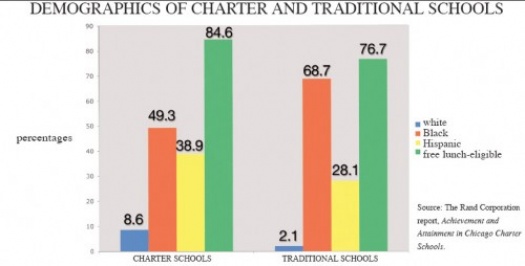
LaRhonda Bardney was desperate when her son graduated from Beasley Elementary School with a D average. Fearing he would flunk out of a traditional high school, she looked to a charter school for help. “I knew coming from Beasley, that going to a nei
“I literally wrote a letter to ACE (Architecture Construction Engineering) Technical Charter High School saying please help me save my son’s life.” According to a recent report, charter schools are one of Chicago Public School’s fastest growing education options.
Parents like Bardney, who fear the violence and low resources at many neighborhood schools, look to them as an alternative. Chicago opened its first three charter schools in 1997, and today has 28%uFFFDmost launched under Mayor Richard Daley’s Renaissance 2010 education revitalization program.
But a recent study by The Rand Corporation found “only small differences” in average achievement gains between charter and traditional schools serving grades three to eight, and even noted a dip in students’ performance their first year of charter school.
The report also found a 7 percent increase in high school graduation and an 11 percent increase in college matriculation, but only in charter high schools that included middle school grades. But the Knowledge Is Power Program Ascend Charter School, which serves grades five to eight, bucks the research trend. Ninetyseven percent of its eighth graders meet or exceed state standards, compared with 74 percent of the district, and 100 percent of its students go on to attend college prep high schools.
According to KIPP Director of Development Carol Hill, the average student enters at a second grade reading level, but through an academic regimen that includes extended school hours (7 a.m.-5 p.m.), biweekly Saturday classes and a longer academic year, they catch up. But it only works if it starts early, Hill said. “We feel that high school is too late to start catching students up academically. Most KIPP schools are middle schools, and some are going to drill down to the elementary school level,” Hill said.
The words “too late” rattle Tim King, who founded Urban Prep Charter Academy for Young Men two years ago. “I try very hard to shy away from using that language. I don’t think it’s ever too late for someone to learn.
I don’t care what kind of education you had before ninth grade,” King said. Urban Prep, Chicago’s only allmale public high school, posted achievement gains 12 points higher than the district average. Like KIPP, Urban Prep has extended hours, Saturday school and a rigorous curriculum, but King agreed that “earlier is better” when it comes to charter schools. “The more time we have with the students, the more progress we can make,” he said.
Dan Kramer is education director at ACE Technical, where achievement gains are seven points lower than the district average. He said that charter schools’ ‘come as you are’ enrollment process poses a challenge. “Charter schools are not selective enrollment high schools. When we compare to the selective enrollment schools, they’re exceeding us,” he said. But he added that the district’s system of using standardized testing to measure progress is fundamentally flawed. “Trying to prepare for a test, as opposed to getting students to have a real broad repertoire of skills, is a very narrow and unsuccessful strategy,” he said.
He referenced David Williams, a senior electrician student whose grades have shot up since he started at ACE. “I’ve wanted to be an electrician since I was a boy, and this was a school that was actually directed to what I was interested in, so it made me more motivated,” Williams said. As for Bardney, her son Khalen was accepted to ACE, and has become a solid B student. Regarding The Rand report, she said there is a “significant difference” between what achievement gains suggest, and what is actually occurring.
Low achievement gains “are not a charter or a traditional school issue. The problem is for Chicago Public Schools, in general, because these students retain the knowledge just long enough to spit it back out. At charter schools the teaching is hands on. You don’t just talk about it, you don’t just read it in a book, you experiment. It sparks eagerness,” she said.
______ Copyright 2008 Chicago Defender. All rights reserved. This material may not be published, broadcast, rewritten, or redistributed.
